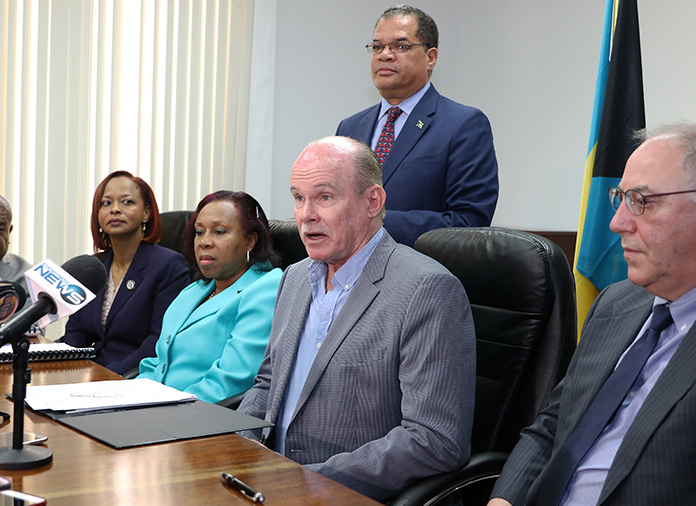Its THESE CAR DEALERS TIME?

NASSAU, The Bahamas – The Ministry of Labour has entered into a Pre-Export Verification of Conformity (PVoC) agreement with EAA Company Ltd. of Japan, to establish parameters for road-worthiness of all vehicles imported from Japan into The Bahamas.
The Hon. Dion Foulkes, Minister of Labour, described the agreement as a “milestone achievement” during the contract signing ceremony Monday, January 21, 2019 at the Ministry of Labour, Charlotte and Shirley Streets.
The contract, which comes at no expense to the government or taxpayers, will begin with a one-year initial pilot programme. As of Monday, January 21, 2019, a 90-day period follows to finalize the implementation process and public education. The $150 inspection fee will be covered by the exporters in Japan. The Bureau of Standards and Quality (BBSQ) receives $20 for each inspection.
Minister Foulkes remarked that Japan has suffered several nuclear accidents, the latest in 2011 in Fukushima, and it is “imperative” that potentially radiated used vehicles are not allowed to enter The Bahamas.
The PVoC programme specifically addresses the risk through a mandatory requirement for radiation inspection on every inspected vehicle.
The contract also includes inspection by EAA of the following: Steering wheel alignment, breaking force, noise level, exhaust gas and pipe emissions, brightness of head lamps, horn sound level, engine, cooling system, fuel system, transmission system, propeller shaft, final draft system, axle housing, suspension system, axles, wheels and tyres, mileage meter, warning lights, frame and vehicle body.
“Many countries around the world have moved and are moving toward the introduction of import regulations that require the pre-shipment inspection of used motor vehicle imports. There is strong evidence to support that such a PVoC programme serves to keep the roads of the countries free of potentially unsafe vehicles,” said Minister Foulkes.
“These regulated programmes are generally self-funding and can provide a source of income for National Standards Bodies (such as BBSQ), through administration fees. This in turn provides income to allow the Regulatory Authority to administer the pre-export inspection programme (without the need for separate funding).”
Minister Foulkes said based on statistics from Arawak Port Development, the vast majority of vehicles were imported from Japan with more than 11,000 passenger and commercial units in 2016, 18,469 in 2017 and 17,191 in 2018 with anticipation for import numbers to be similar to that of 2017 and 2018 in 2019.
“From these statistics, the need to ensure these imports are ‘roadworthy’, prior to leaving the countries of origin, is essential to protect The Bahamas from continuing to be a “dumping ground” for unsafe motor vehicles,” he said.
Renee Ferguson-Bufford, Director, BBSQ, said many vehicles, one year after being imported, are being dumped on the side of the road, and left for the government to move.
“We want to ensure, [we’ve had a lot of accidents with many of these cars] moving forward that we are not a dumping ground for such vehicles,” said the Director.
“We will begin to work with Road Traffic [Department], a part of our National Technical Committee, [Ministry of] Public Works, Customs [Department], Ministry of Finance and other regulatory bodies and used car dealerships. Road Traffic is now looking at their laws to ensure compliance to these specifications.”
According to Lee Sayer, EAA Vice-President/Director, if a vehicle does not pass inspection it will be rejected and required to be brought to standard or renegotiated with the importer for a replacement.
“Every vehicle that passes inspection will receive a certificate of compliance. Each vehicle will have window stickers placed on the vehicle. One of the stickers will be certification that has passed the radiation inspection. The vehicle itself also will have an EAA road readiness inspection sticker placed on it. As an importer you will have access, if you have the chassis number of the vehicle, to our website database to which you will be able to determine the inspection confirmation. The regulatory authority will also have separate access to the database also any other regulatory stakeholder in The Bahamas,” said Mr. Sayer.
EAA is a used vehicle inspection specialist that was established in 2007. Its headquarters are based in Yokohama, Japan.







